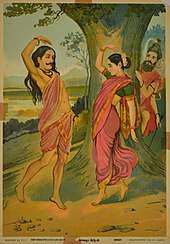Bhasmasura (Hinduism)
In Hindu religion, Bhasmasura (Sanskrit: भस्मासुर, Bhasmāsura), also known as Brahmasura,[1] was an asura or demon who was granted the power to burn up and immediately turn into ashes (bhasma) anyone whose head he touched with his hand. The asura was tricked by the Lord Vishnu's only female avatar, the enchantress Mohini, to turn himself into ashes.

Legend
Bhasmasura was a devotee of the Lord Shiva who performed great penance to obtain a boon from the deity. Shiva became pleased and asked him to ask for a boon. Bhasmasura then asked that he be granted the power that anyone whose head he touched with his hand should burn up and immediately turn into ashes (bhasma). Bhasmasura then wreaked havoc across the world with his new found power torturing everyone in sight as he was of low moral fibre. So the rishis ran to Vishnu for help. Vishnu, in the form of Mohini, appeared in front of Bhasmasura. Mohini was so exceedingly beautiful that Bhasmasura immediately fell in love with Mohini. Bhasmasura asked her to marry him. She told him that she was very fond of dancing, and would marry him only if he could match her moves identically. Bhasmasura agreed to the match and hence they started dancing. The feat went for days at an end. As Bhasmasura matched the disguised Vishnu's move by move, he began to let his guard down. While still dancing, Mohini, struck a pose where her hand was placed on top of her own head. As Bhasmasura imitated her, he was tricked into touching his own head, and hence Bhasmasura immediately burnt up and turned into ashes, due to the power he had recently gained.
There is a common misconception that Shiva fled from Bhasmasura. None of the original scriptures mention that Bhasmasura tries to place his hand on Lord Shiva or about Lord Shiva fleeing. Shiva is the Destroyer in the Trimurti (other being Brahma and Vishnu) and hence is part of the only three beings who have absolute immortality and omnipotence as a result of which he can bypass Bhasmasura's boon whenever he wants but since rules of universe apply to everyone Bhasmasura has to die without violation of boon given by Lord Shiva.
The other variation of this, in a nut shell, is: Vishnu appears in the form of Mohini. Bhasmasura forgets of newly acquired boon and asks Mohini to marry him. She agrees and asks Bhasmasura to take a dip in the lake and clean himself as he is not clean at the present condition. Bhasmasura is too happy to take a dip in the lake. He tries to get rid of the excess water in his hair (dries his hair) by running his hands over his head. Bhasmasura turned into ashes with the power of newly acquired boon.
Mohini Bhasmasura Kuchipudi Dance Ballet In Kuchipudi dance also "Mohini Bhasmasura" is a very famous dance drama. Many Artists performed this ballet. Mainly Bharathakaprapoorna Sri Korada Narasimha Rao a famous Kuchipudi exponent performed Bhasmasura, in Mohini Bhasmasura Kuchipudi Dance ballet, his performance unforgettable. His expression, way of dance, and his dialogues extraordinary. 1st Padmasree awardee in Kuchipudi dance, great dancer Sri Vedantham Satyanarayana Sarma played Mohini role in a great way in this ballet. His abhinaya, dressing as women, dance all are unique. This ballet was conducted by Andhra Pradesh Nruthya Academy a Long ago. All great artists like Padma Sree Awardee Dr. Nataraja Rama Krishna did nattuvangam, Sri Korada Narasimha Rao as Bhasmasura, Sri Vedantham Satyanarayana Sarama as Mohini, great artist Dr.Sampath Kumar as Siva, another great artist Sri Gopal Raj Butt as Naradha. Great Combination.
In dance
To escape from Bhasmasura, the cave where Lord Mahadev is hidden is known as Guptdham.
In the Saho area of Chamba district in the State of Himachal Pradesh, the Sohal Nati dance is very popular. It is generally performed on all festive occasions, but the main importance of this dance is in Baisakh during the days of Saho fair. The dance is based on the story of Lord Vishnu killing Bhasmasura, and hence, it is also known as Mohini-Bhasmasura dance.
Based on the popular story, the dancers take different postures leading to them ultimately revolving both their hands on their heads. The dancer enacting Bhasmasura is placed at the end of row and he is the last dancer to revolve his hands over his head.[2]
The Bhasmasura-type pose--with one hand atop the head and the other behind the back--is also common in women's dancing in the Bhojpuri region and, by extension, in Indo-Caribbean society, where it is a typical feature of chutney dancing. A few Indo-Caribbeans claim that this pose relates to the Bhasmasura myth.[3]
Mohini Bhasmasura Kuchipudi Dance Ballet In Kuchipudi dance also "Mohini Bhasmasura" is a very famous dance drama. Many Artists performed this ballet. Mainly Bharathakaprapoorna Sri Korada Narasimha Rao a famous Kuchipudi exponent performed Bhasmasura, in Mohini Bhasmasura Kuchipudi Dance ballet, his performance unforgettable. His expression, way of dance, and his dialogues extraordinary. 1st Padmasree awardee in Kuchipudi dance, great dancer Sri Vedantham Satyanarayana Sarma played Mohini role in a great way in this ballet. His abhinaya, dressing as women, dance all are unique. This ballet was conducted by Andhra Pradesh Nruthya Academy a Long ago. All great artists like Padma Sree Awardee Dr. Nataraja Rama Krishna did nattuvangam, Sri Korada Narasimha Rao as Bhasmasura, Sri Vedantham Satyanarayana Sarama as Mohini, great artist Dr.Sampath Kumar as Siva, another great artist Sri Gopal Raj Butt as Naradha. Great Combination.
References
- NV Isaeva. Shankara and the Indian Philosophy. SUNY Press. p. 228. ISBN 9788170303732.
- "Archived copy". Archived from the original on 2009-09-17. Retrieved 2010-03-14.CS1 maint: archived copy as title (link)
- Manuel, Peter (2000). East Indian Music in the West Indies: Tan-singing, Chutney, and the Making of Indo-Caribbean Culture. Philadelphia: Temple University Press. pp. 237. ISBN 1-56639-763-4.